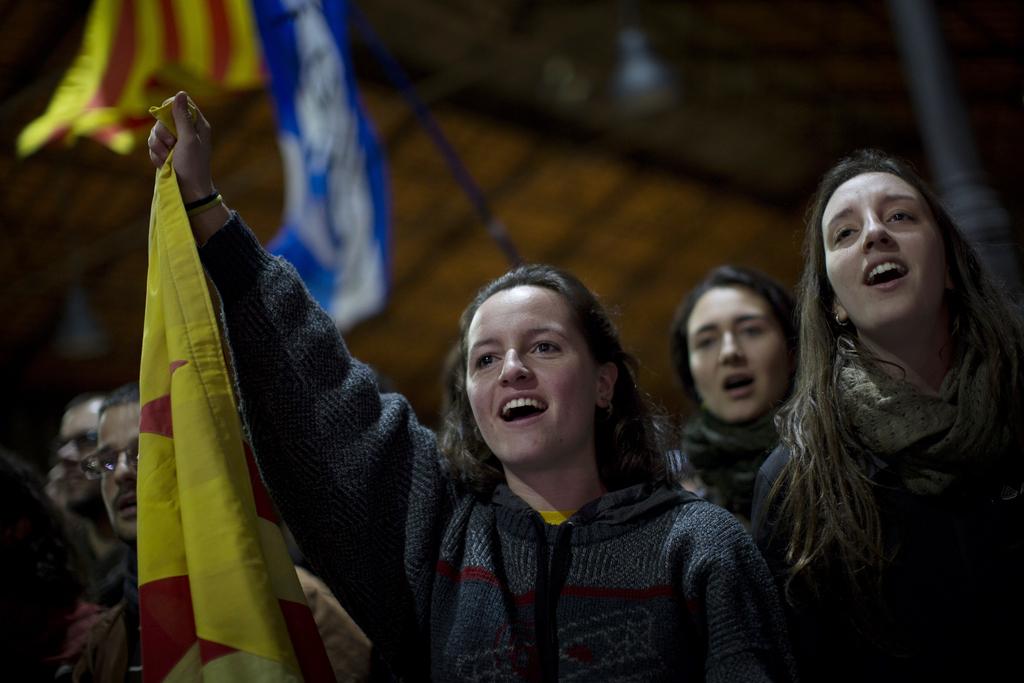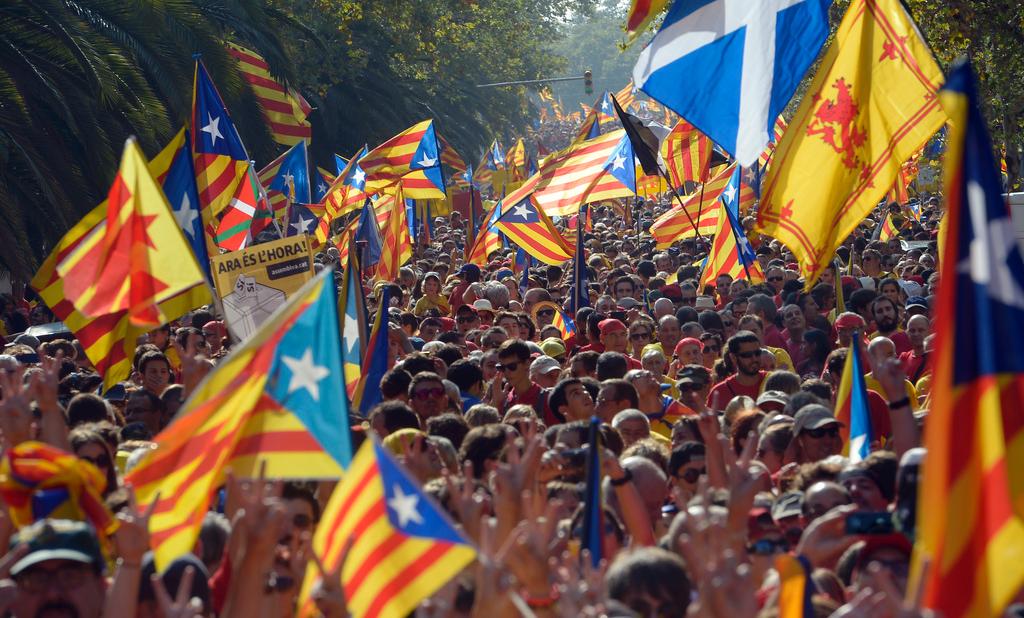‘A referendum is democratic only if it is transparent’

Following a series of setbacks, separatists in Catalonia, one of Spain’s regions, are now refining political mechanisms to pursue their struggle against the central government with another ballot.
Last November, the Catalan authorities organised a vote, but it was mainly symbolic as the principle of self-determination of a region is ruled out by Spain’s constitution.
The government in Madrid lacks the political will to open channels that would allow a democratic expression on the issue of secession, according to experts.
“It is not a legal problem but rather a political process”: Eva Sáenz, a constitutional expert and professor at the University of ZaragozaExternal link, and Manuel Manonelles, responsible for multilateral and European relations in Catalonia’s regional government, agree on this point.
Discrepancies in their views on separatist aspirations, and how best to move forward, represent the two sides of the same, unresolved, debate.
Both participated in a recent debate about referendums, autonomy and sovereignty, organised by the National Center of Competence in Research on Democracy at the University of ZurichExternal link.
The two speakers later summarised their positions in an interview with swissinfo.ch.
swissinfo.ch: What are the reasons for separatist aspirations?
Manuel Manonelles: After 30 years of seeking ways to co-habitate with the rest of the Spanish state, the people of Catalonia see that during recent years, the Spanish government has moved towards a re-centralisation.
This affects not only the administration and economy, but also issues that are especially central for our country, such as our language and culture. ,Therefore Catalans are reconsidering the model that should lead them into the future.
Eva Sáenz: There are no reasons for separatist sentiments in Catalonia. There is no injustice in Catalonia.
In the past, it had existed under [General Francisco] Franco’s regime, when Catalans were persecuted, but now there is no reason for injustice, as we have a federal system.
Catalonia has political and financial autonomy. Catalan is recognised as an official language. What exists is not a rational problem, it is an emotional problem. But feelings in politics are important, and need to be respected.
swissinfo.ch: How do you respond to those would like to separate from Spain?
M.M.: What we propose, and what the majority of the Catalonian population and the parliament request, is the opportunity to conduct a referendum in which Catalonia may decide on its future, according to international standards and democratic principles.
The result could be a No, as it was in Scotland, but the right to decide on our future is the basis of our demand.
E.S.: This is a legitimate political aspiration. What should be decided is what the best way is to allow this political ambition to become a reality, and which conditions and majority would be needed to allow for a break from these issues, which would represent a departure, with no return.
swissinfo.ch: Why did the Spanish government rule out the proposed options to recognise the will of the Catalonian people?
M.M.: The issue is that the central government believes that Spain is a rigid unit.
Instead of confronting the political issue from a political perspective, it attempts to use an extremely restrictive constitution and legal mechanisms to halt what is a democratic expression.
E.S.: The reasoning by the central government is that since the question is not constitutional – because the principle of self-determination is not recognised in Spain – one would have to amend the constitution first, before asking the question in Catalonia.
However, this represents a perspective that most constitutional experts, including myself, do not agree with, as it is a political problem, not a legal one. Political will is therefore required.
swissinfo.ch: As the Spanish constitution does not recognise secession, what alternatives could be considered?
M.M.: We believe that Spain is already a perfectly consolidated democratic state, and would prefer that the context be different. So that our referendum could be held according to, and on the basis of, constitutional provisions allowing it to take place.
As this is not the case, we continue to be entirely willing to find mechanisms within the Spanish legal framework, and otherwise, under international legal norms, so that the Catalan people can decide on their future.
It would need to be an agreed process, and at one stage the constitution would have to be reformed, though it is true that the issue of territorial integrity is a difficult one.
The constitution was established in 1978. Large parliamentarian majorities, congressional changes and other referendums would be required for this to happen.
In any case, Catalonia is prepared to promote this, we already attempted to do so, and it was not the first time. Therefore, we are opting to use elections [in September] to consult the plebiscite.
Once we clarify that clear majorities in parliament and the Catalan population are in favour of secession, we will have to find more practical mechanisms to make the necessary legal reforms.
This would be to ensure that everything can be done in strong agreement with Spain, which will continue to be our closest and dearest neighbors.
We will continue to do things together, including business, and maintain strong family and fraternal ties.

More
Catalonia: 80% back independence in mock vote
E.S.: The course is marked by a decision taken by Canada’s Supreme Court [with regard to Quebec’s separatist ambitions].
The Canadian constitution, too, does not recognise the principle of self-determination, but a procedure was crafted that would allow a political process to occur, and carry out a legitimate political aspiration.
According to this process, one would first have to organise a referendum in Catalonia.
It would be consultative, rather than decisive, in order to understand what it represents, and if a clear majority truly exists, before proceeding with the rest of the process.
If a clear majority of Catalans wants independence, in order to maintain our constitutional system, negotiations on amending the constitution would be needed. Then Catalonia can become independent.
All this would require a mutual agreement and time.
I also do not think that calling a referendum, as the government of Catalonia wanted to do, is the most appropriate option.
Last November’s vote was not representative. The conditions of the vote were not democratic, as polling supervisors were all separatists.
It was set within a context that was favourable to its organisers, including a massive economic crisis. Negative campaigning by the government played into the hands of pro-independence aspirations, and the presentation of confusing questions on which to vote.
A referendum is democratic only if it is transparent.
In a regional election set for 27 September 2015, Catalans will effectively decide in favor or against independence.
A Yes vote would activate a process allowing for independence to be achieved within 18 months, according to Artur Mas, president of the regional government.
Elections were called in order to understand “if Catalans wanted an independent state, or not”, after unsuccessful attempts by separatists to come to an agreement with the central government over a consultation of citizens.
On 9 November 2014, Catalan authorities organised a symbolic poll (termed as a “participative process”), after effectively being denied a referendum by the people.
More than two million people, representing 36% of the electorate in Catalonia, went to the polls and voted in favour (80%) of establishing a sovereign state.
For organisers of the vote, the result was a clear demonstration of the people’s will.
Translated from Spanish by Paula Dupraz-Dobias

In compliance with the JTI standards
More: SWI swissinfo.ch certified by the Journalism Trust Initiative


You can find an overview of ongoing debates with our journalists here . Please join us!
If you want to start a conversation about a topic raised in this article or want to report factual errors, email us at english@swissinfo.ch.